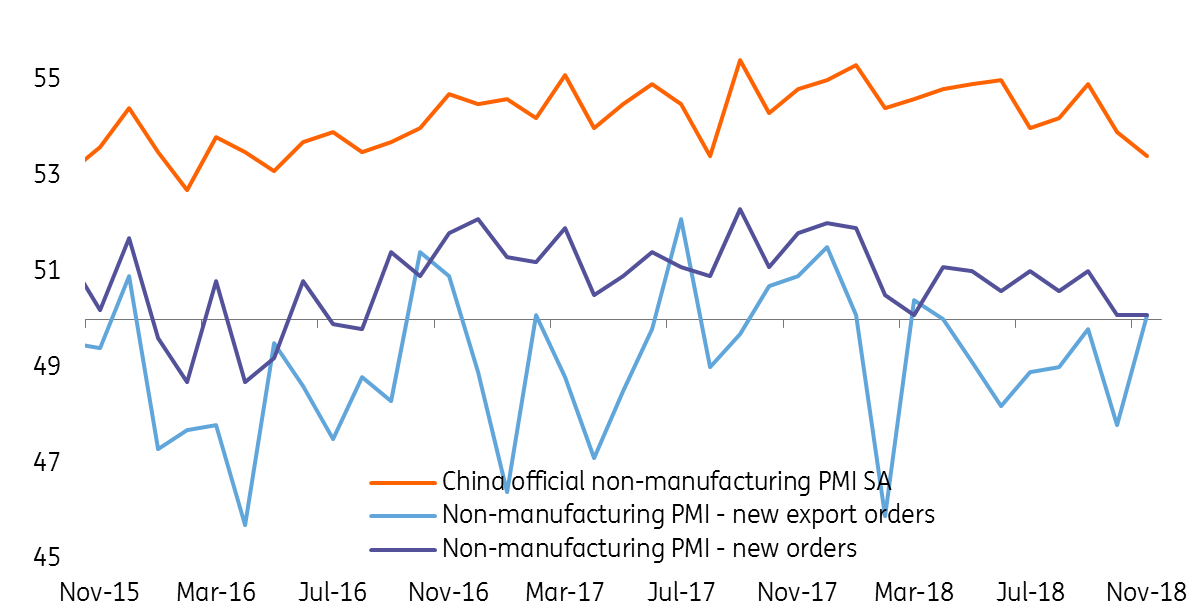China: PMI disappoints but stimulus is coming
Though both official manufacturing and non-manufacturing PMIs are worse than expected, we believe that stimulus is on the way as local governments have raised funds to finance infrastructure projects
Manufacturing PMI at the brink of 50
Manufacturing activities did not grow in November despite local governments having raised funds for infrastructure projects. New orders grew slower to 50.4 in the month, down from 50.8 a month ago. New export orders were still gloomy at 47 but edged up from 46.9. It shows that stimulus on infrastructure projects has come in later than expected.
Slower new orders show stimulus was slow to get into the economy

But stimulus from local governments should arrive soon
The come back of local government financial vehicles should mean that stimulus via infrastructure projects is on the way. But it seems that some of the funds could have been used for debt repayments, and have yet to get new infrastructure projects up and running. But with the massive issuance of debt from local governments, via local government financial vehicles and local government special bonds, we expect stimulus will be more obvious in adding manufacturing activities from December.
We also expect that the government is going to cut import tariffs on more goods. This will reduce production costs in the manufacturing sector.
But we expect new export orders to keep contracting as long as the trade war continues, not to mention that the trade war tension could escalate after this weekend's meeting between President Xi and President Trump.
Non-manufacturing PMI shows that consumption is slowing but it should be temporary
A slowdown in non-manufacturing activities is a concern. Catering and real estate services were in contraction according to the Statistic Bureau. Shrinking real estate services, a result of a fall in housing market transaction volume will continue in the coming months until more local governments relax tightening measures.
The contraction of the catering service is a surprise to us. It reflects that consumption is falling. But this could also be temporary as an expansion of activities in financial services, including insurance activities that back up loan growth, could provide a lifeline to private companies, which will secure jobs, and therefore consumption.
Non-manufacturing PMI falling steeper than expected

Overall, we are not pessimistic
As fiscal stimulus is on the way, we believe that both manufacturing and non-manufacturing activities should be steady from here. Our estimate of the size of fiscal stimulus is around CNY9-10 trillion for late 2018-2020, ie, averaging CNY4 trillion each year in 2019 and 2020.
Though some fiscal money will be used for debt repayment and loan rollovers, the rest will go into infrastructure projects, which will support manufacturing activities, even if the trade war continues to escalate.
Financial and insurance activities for lending and insurance to back up loans will support non-manufacturing activities.
As such we keep our GDP forecast at 6.3% in 2019 from 6.6% in 2018.
Download
Download article
3 December 2018
Good MornING Asia - 3 December 2018 This bundle contains {bundle_entries}{/bundle_entries} articles"THINK Outside" is a collection of specially commissioned content from third-party sources, such as economic think-tanks and academic institutions, that ING deems reliable and from non-research departments within ING. ING Bank N.V. ("ING") uses these sources to expand the range of opinions you can find on the THINK website. Some of these sources are not the property of or managed by ING, and therefore ING cannot always guarantee the correctness, completeness, actuality and quality of such sources, nor the availability at any given time of the data and information provided, and ING cannot accept any liability in this respect, insofar as this is permissible pursuant to the applicable laws and regulations.
This publication does not necessarily reflect the ING house view. This publication has been prepared solely for information purposes without regard to any particular user's investment objectives, financial situation, or means. The information in the publication is not an investment recommendation and it is not investment, legal or tax advice or an offer or solicitation to purchase or sell any financial instrument. Reasonable care has been taken to ensure that this publication is not untrue or misleading when published, but ING does not represent that it is accurate or complete. ING does not accept any liability for any direct, indirect or consequential loss arising from any use of this publication. Unless otherwise stated, any views, forecasts, or estimates are solely those of the author(s), as of the date of the publication and are subject to change without notice.
The distribution of this publication may be restricted by law or regulation in different jurisdictions and persons into whose possession this publication comes should inform themselves about, and observe, such restrictions.
Copyright and database rights protection exists in this report and it may not be reproduced, distributed or published by any person for any purpose without the prior express consent of ING. All rights are reserved.
ING Bank N.V. is authorised by the Dutch Central Bank and supervised by the European Central Bank (ECB), the Dutch Central Bank (DNB) and the Dutch Authority for the Financial Markets (AFM). ING Bank N.V. is incorporated in the Netherlands (Trade Register no. 33031431 Amsterdam).
